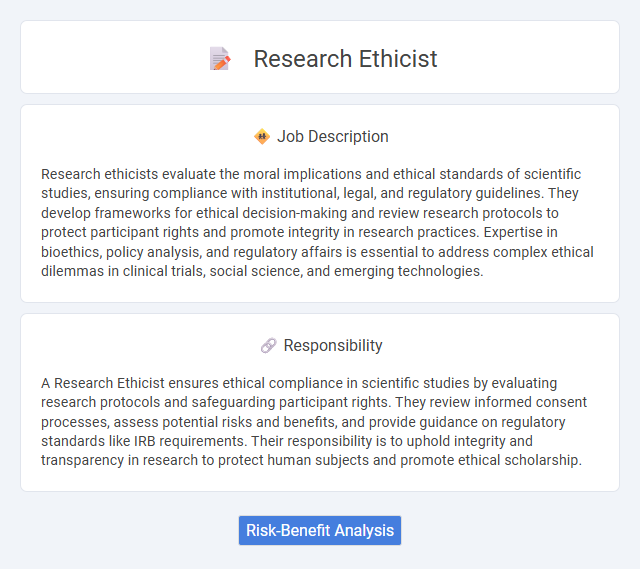
Research ethicists evaluate the moral implications and ethical standards of scientific studies, ensuring compliance with institutional, legal, and regulatory guidelines. They develop frameworks for ethical decision-making and review research protocols to protect participant rights and promote integrity in research practices. Expertise in bioethics, policy analysis, and regulatory affairs is essential to address complex ethical dilemmas in clinical trials, social science, and emerging technologies.
People with a strong sense of integrity and an ability to evaluate complex moral dilemmas might be suitable for a Research Ethicist role. Those who are comfortable working in multidisciplinary environments and can navigate regulatory frameworks may have a greater probability of success. Individuals struggling with ambiguity or ethical nuance might find this job challenging.
Qualification
A Research Ethicist must possess a strong background in bioethics, philosophy, law, or related fields, typically holding an advanced degree such as a Master's or PhD. Expertise in ethical principles, regulatory compliance, and experience with Institutional Review Boards (IRBs) or ethics committees is essential. Skills in critical analysis, communication, and policy development are crucial to guide ethical decision-making in research environments.
Responsibility
A Research Ethicist ensures ethical compliance in scientific studies by evaluating research protocols and safeguarding participant rights. They review informed consent processes, assess potential risks and benefits, and provide guidance on regulatory standards like IRB requirements. Their responsibility is to uphold integrity and transparency in research to protect human subjects and promote ethical scholarship.
Benefit
Research ethicists likely play a crucial role in ensuring that studies adhere to moral standards, potentially enhancing the integrity and credibility of research outcomes. Their work probably helps protect participants' rights and well-being, which may increase public trust and willingness to engage in research. This ethical oversight could ultimately contribute to more responsible and impactful scientific advancements.
Challenge
Research Ethicists likely face the challenge of balancing scientific innovation with ethical considerations, ensuring studies respect participant rights while advancing knowledge. Navigating complex regulatory frameworks and evolving societal norms may complicate decision-making processes. The probability of encountering conflicting interests between stakeholders requires strong judgment and communication skills to maintain research integrity.
Career Advancement
A Research Ethicist plays a crucial role in ensuring compliance with ethical standards across scientific studies, which positions them for advancement into leadership roles within ethics committees or academic institutions. Expertise in bioethics, regulatory policies, and risk assessment enhances opportunities for career growth, often leading to senior advisory or director-level positions. Continuous professional development and contributions to ethical guidelines or publications significantly boost a Research Ethicist's professional trajectory.
Key Terms
Risk-Benefit Analysis
Research ethicists specialize in evaluating the ethical implications of scientific studies, with a core focus on conducting thorough risk-benefit analyses. This process involves systematically assessing potential risks to participants against anticipated benefits to ensure research complies with ethical standards and regulatory requirements. Expertise in risk-benefit analysis is crucial for protecting human subjects and maintaining the integrity of biomedical and social science research.
 kuljobs.com
kuljobs.com